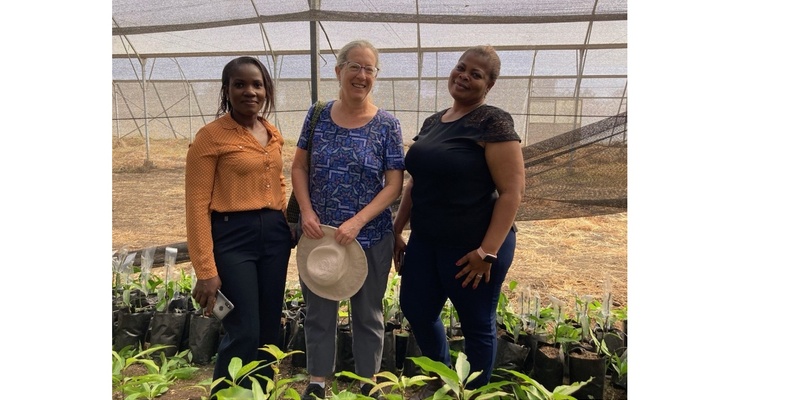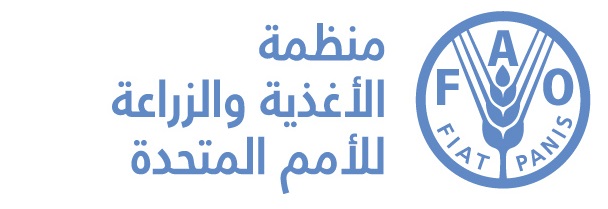SPOTLIGHT: Barbara Peterson shares her experience, as an in-kind contribution, working at the IPPC Secretariat
Posted on جمعة, 29 نوفمبر 2024, 08:00

Josephine Mphozongo (Malawi Department of Agriculture Research Services), Barbara Peterson and Elizabeth Mumba (Malawi Ministry of Trade and Industry) during the second PCE mission in Malawi at a mango production and processing facility, "Malawi Mangoes" (Salima, Malawi) © FAO
As a spotlight feature for this month, we speak to Barbara Peterson working at the IPPC Secretariat as Implementation and Facilitation Unit Officer thanks to in-kind contribution from the Canadian Food Inspection Agency (CFIA).
Thank you for joining me today, Barbara. Can you start by providing a brief introduction to your career and milestones?
Certainly! I hold a Master’s degree in Pest Management and began my career as an integrated pest management consultant, scouting horticultural crops, importing beneficial insects, and providing pest management recommendations to farmers. After 10 years in consultancy, I joined CFIA in 2002, working on horticulture and import/export regulations. In 2019, I was seconded to the Implementation and Facilitation Unit of the IPPC Secretariat as an in-kind contribution, home-based in Canada.
Had you worked with the IPPC Secretariat before 2019 and what sparked your interest in joining as in-kind contribution?
Yes, I participated in two IPPC expert working groups. The first was to develop a draft standard on growing media in association with plants for planting and the second was on pest risk management. I was also a member of a couple North American Plant Protection Organization (NAPPO) expert panels and attended several NAPPO meetings, which gave me a strong understanding of IPPC processes. My interest in the Secretariat grew from recognizing the shared plant health concerns across countries and the value of global collaboration. Canada had previously supported an in-kind contribution through my colleague Shane Sela, who worked on ePhyto. Hearing about his impactful work inspired me to apply when CFIA posted a new position focusing on e-commerce and implementation and capacity development.
Could you summarize your main responsibilities within the Implementation and Facilitation Unit at the IPPC Secretariat?
My primary focus has been e-commerce, a key development agenda in the IPPC’s 2020–2030 Strategic Framework. Working with the Implementation and Capacity Development Committee (IC) Team on e-commerce, I led the development of a work plan with tangible outcomes, including the IPPC guide, other capacity development materials, and the recently launched IPPC Observatory study on e-commerce. Additionally, I led the development of other IPPC guides, such as the one on pest status to support the implementation of ISPM 8 and another on wood packaging material to support implementation of ISPM 15. I also worked with the IC Team on guides and training materials to establish a streamlined procedure for developing IPPC guides and training materials under the oversight of the Implementation and Capacity Development Committee. The goal was to ensure these important capacity-building resources offer practical reliable guidance and are readily accessible to the entire phytosanitary community.
You joined the IPPC Secretariat just as the pandemic hit and everything went remote, how did this affect your work?
COVID-19 made launching new projects like e-commerce challenging but also led to innovative solutions. For example, several face-to-face training workshops were planned to take place in 2020, in the Common Market for Eastern and Southern Africa (COMESA) region, as part of the COMESA Trade Facilitation Project. Due to the pandemic, we transitioned to working online and the project team decided to use the budget, initially planned for in-person trainings, to develop IPPC e-learning courses, as a forward-thinking and practical approach. These courses have become a cornerstone of the IPPC Secretariat’s capacity development materials. They are an invaluable resource to the global phytosanitary community offering flexible, accessible, and self-directed learning opportunities, freely available to all. We’ve since developed more e-learning content and translated it into additional languages.
Remote work was another adjustment as I am home-based, working from Vancouver, Canada. Initially, it was easier to integrate because the entire team worked remotely. Now that the team is back in the office, working remotely with a nine-hour time difference can feel a bit isolating. Working within a cohesive and supportive team and having a strong plant health background have allowed me to work productively, despite being home-based and in a different time zone. In fact, I feel that when my term ends in April 2025, I will have accomplished all the key activities that I set out to do during my assignment with the IPPC Secretariat.
What have been the main professional benefits, for you, of working in the Secretariat?
Professionally, I gained in-depth knowledge about IPPC governance and global plant health initiatives. Joining a global and diverse team like the IFU within the IPPC Secretariat means meeting internationally recognized technical experts and learning from diverse perspectives which is very inspiring and professionally enriching. One significant highlight has been becoming a certified Phytosanitary Capacity Evaluation (PCE) facilitator, through the Strengthening Food Control and Phytosanitary Capacities and Governance project. Thanks to this I have learnt how to support NPPOs in conducting PCEs and had the opportunity to facilitate a PCE first-hand in Malawi—an incredible and enriching experience.
And the benefits to the IPPC Secretariat and the NPPOs, in this case CFIA, to support in-kind contributions?
In-kind contributions bring subject-matter expertise from NPPOs to the Secretariat, adding significant value to its work. They also provide the Secretariat with stable, longer-term staffing to address its resource challenges.
For NPPOs like CFIA, these roles often align quite closely with national priorities and are an excellent way to enhance their contributions to global plant health. My work at the Secretariat has advanced some topics which are also priorities for Canada, such as e-commerce and wood packaging material moving in international trade. Upon returning to CFIA in 2025, I’ll bring with me valuable insights on IPPC governance, processes, and global initiatives to further strengthen CFIA’s contributions to global plant health efforts.
What message would you share with other NPPOs and individuals considering similar roles?
In-kind contributions are essential to the Secretariat’s stability and effectiveness, enabling long-term project work and resulting in meaningful outcomes. We are currently five in-kind staff working at the IPPC Secretariat, thanks to in-kind contributions from Australia, France, Japan, the United States, and myself from Canada. For individuals, it’s an excellent opportunity to expand your horizons, network globally, and make a tangible impact on plant health. I encourage interested NPPO staff to watch-out for in-kind contribution calls—one was recently launched for an ePhyto Programme Assistant!
Related information

